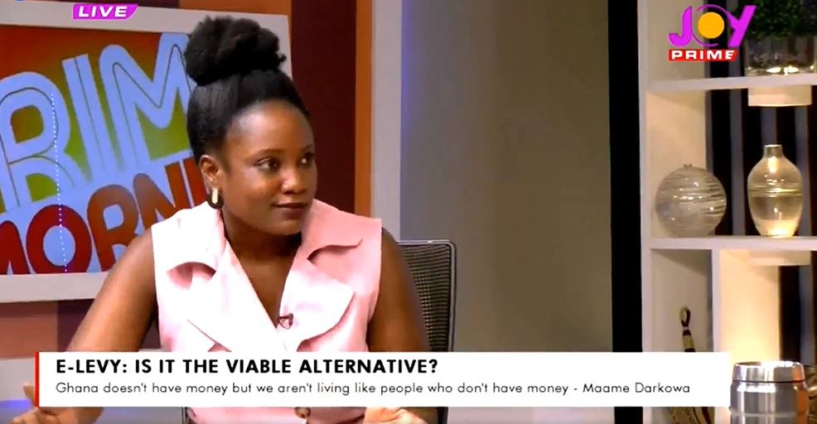An International Trade Law Expert, Maame Darkowa Awinador-Kanyirige, has bemoaned what she calls the high level of wastefulness in the country and government’s unwillingness to cut down its expenditure.
She emphasised that for many years, the state has been unable to institute pragmatic strategies and solutions to increase revenue generation, a reason the country’s economy has been in crisis.
Speaking in an interview on Prime Morning on Thursday, February 3, she stated unequivocally that “being broke [as a country] is just the reality of what is happening on the bigger scale but the reality also is that we don’t have money but we are also not living like people who don’t have money.”
Maame Awinador-Kanyirige added that the Electronic Transactions Levy (e-levy) may help the state to raise some revenue in the immediate term; however, the best approach is for government to reduce its expenditure and boost local production.
On the e-levy, she noted that “if you look at the estimate of how much to expect, it is not even enough…we have debts to pay.”
“People already pay taxes but the cost of living is high that is why people are not understanding. What GHC100 could do last year, it cannot do this year. What is a ¢1,000 these days? We have to be honest as to what the cost of living is to even be able to say if you’re spending this money a day, you should be able to pay the e-levy.”
“It [e-levy] is not the only way but the thing is that it’s going to require heavy adjustments; are we willing to make? If we go to the IMF, the first thing the IMF will do or say is ‘cut expenditure’ – the very thing that we don’t want to do. We are spending on things that are not necessities for people who are where we are at,” she added.
Meanwhile, a Professor of Economics and Finance, Prof. Godfred Bokpin, has blamed the government for its failure to address the inefficiencies and low compliance with existing tax policies over the years.
He says government’s inability to block the leakages in tax revenues is what has rendered the economy weak, a development he warns could deprive the state of its objective to remain competitive on the digital economy market.
“You want to look at the overall drive of the country and you realise that imposing this tax is more or less to reverse or redirect the direction of this economy and you’re going to lose massively in terms of competitiveness in the digital economy,” he spoke on the same show.
Latest Stories
-
GPL 2024/25: Young Apostles hand Samartex first home defeat since March
15 mins -
Unconventional Trump brings openings and perils for Africa
45 mins -
Iseguri Initiative fights teenage pregnancy and early child marriage
1 hour -
‘Dreams quashed’: Foreign students and universities fear Australia’s visa cap
2 hours -
G20 talks in Rio reach breakthrough on climate finance, sources say
2 hours -
2024/25 Ghana League: Bechem United shock Chelsea in Berekum
4 hours -
GPL 2024/25: Nations FC beat Asante Kotoko to go top
4 hours -
GPL 2024/2025: Gold Stars drop to 2nd after 2-0 defeat to Medeama
4 hours -
#GPL 2024/25: Hearts pip Karela in Tamale to move into top 4
4 hours -
Feedback from Klopp, others more valuable than just anybody – Otto Addo to critics
4 hours -
Support us if you want to qualify for the World Cup – Otto Addo to Ghanaians
4 hours -
Defective ballot papers for Ahafo and Volta Regions destroyed by EC
5 hours -
Election 2024: Be fair and transparent – Togbe Afede to EC
5 hours -
AFCON 2025Q: Poor home form cost us – Otto Addo
5 hours -
Togbe Afede criticises recent Supreme Court rulings as uninspiring and illogical
5 hours

